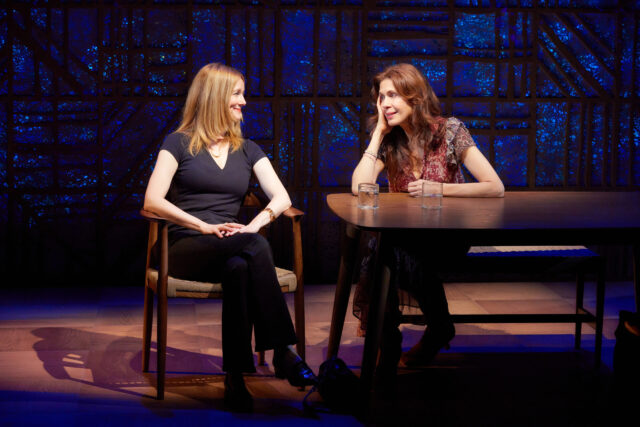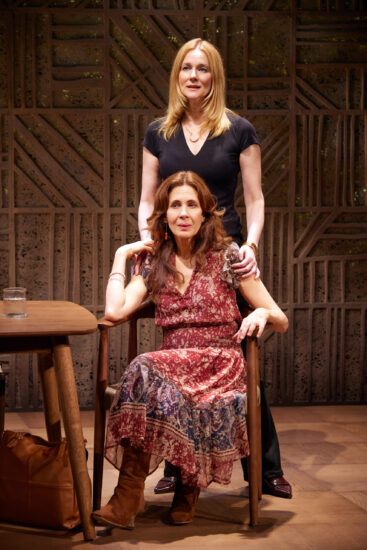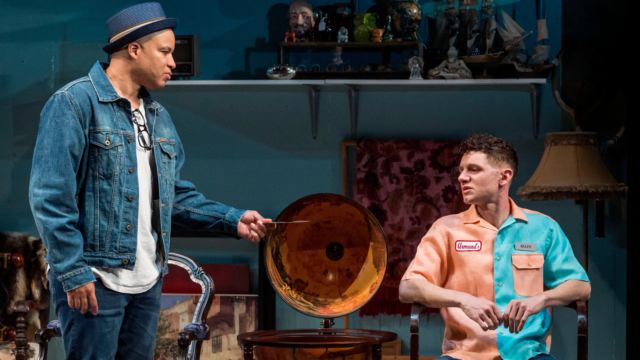
Diana (Laura Linney) and Alice (Jessica Hecht) are forced to become friends in Summer, 1976 (photo © Jeremy Daniel, 2023)
SUMMER, 1976
Samuel J. Friedman Theatre
261 West Forty-Seventh St. between Broadway & Eighth Ave.
Tuesday – Sunday through June 18, $84-$338
www.manhattantheatreclub.com
“Life is an awful, ugly place to not have a best friend,” Sarah Dessen writes in her 1998 young adult novel Someone Like You.
YA novels are often obsessed with portraying teen friendships, while adult friendships generally receive less attention. Two current plays anchored by terrific performances remedy that neglect, focusing exclusively on adult same-sex cisgender platonic relationships. In Pulitzer Prize winner David Auburn’s Summer, 1976 two women meet through their young children, while in Pulitzer Prize finalist Rajiv Joseph’s King James two men bond over their love of basketball star LeBron James. While neither two-character show is a slam dunk, they both got plenty of game.
In MTC’s Summer, 1976 at the Samuel J. Friedman Theatre, Diana (Laura Linney) and Alice (Jessica Hecht) spend most of the ninety-minute play sitting on opposite sides of a long, rectangular table, their chairs facing the audience, who they address directly. At the beginning, Diana, an artist and teacher at Ohio State, tells us how much she doesn’t like Alice’s daughter, Holly. Alice, whose husband, Doug, is an economist at the university, then explains how she “sort of immediately hated” Diana but realizes she will have to put up with her because Alice’s daughter, Gretchen, is getting along with Holly. Diana is a much stricter mother who doesn’t hide what she believes is her superiority over Alice. “Parents who can’t or won’t control their kids aren’t upset when you do it for them. They’re grateful and ashamed,” she says, describing Alice as a “sleepy-eyed little hippie.”

Laura Linney and Jessica Hecht play two very different women in David Auburn world premiere (photo © Jeremy Daniel, 2023)
After passing a joint to the serious, sophisticated Diana, the free-spirited Alice complains, “She fucking bogarted it for like five minutes, and I was like, come on, lady, I only took it out because it was the only way I could imagine getting through the next ten minutes before I could make an excuse and leave.” But soon after that they actually become friends, sharing intimate details about their fears and desires, discussing interior decoration choices, a sexy house painter, the sanctity of marriage, highbrow vs. lowbrow television, music, and literature, and a complicated “cashless, self-sustaining system” Doug has developed to barter baby-sitting time in their community.
The final scene takes place about twenty-five years later, when we learn how their two-month friendship impacted the rest of their lives.
John Lee Beatty’s set features a three-sided gridlike wooden backdrop with two doorways that the characters can use as an exit but don’t, sticking around to hear what the other one has to say. Japhy Weideman’s lighting and Hana S. Kim’s projections change day to night, adding blue sky and twinkling stars. Tony winner Daniel Sullivan (If I Forget, Lost Lake) can’t quite get a firm grasp of Auburn’s (Proof, The Columnist, Lost Lake) narrative, which is too slight and gets bumpier as the conclusion approaches.
Tony nominee and four-time Emmy winner Linney (My Name Is Lucy Barton, The Little Foxes) and Tony nominee Hecht (Letters from Max, The Orchard) form a terrific duo, the former firm and direct, the latter loose and quixotic. For much of the show they are separated by the length of the table, occasionally reaching for each other but unable to make contact.
At a talkback following the matinee I saw, they couldn’t stop touching hands and shoulders, as if they suddenly required meaningful physical connection. It also was clear that the two of them have become real-life friends because of the show, which added a lovely note to the afternoon.

Matt (Chris Perfetti) and Shawn (Glenn Davis) bond over basketball and LeBron in King James (photo by Craig Schwartz)
KING JAMES
MTC at New York City Center – Stage I
131 West Fifty-Fifth St. between Sixth & Seventh Aves.
Tuesday – Sunday through June 18, $79-$99
www.manhattantheatreclub.com
Rajiv Joseph shoots and scores with King James, making its New York premiere at MTC at New York City Center.
The play is divided into four quarters, like a basketball game, as two lonely twenty-one-year-old Cleveland Cavaliers fans unexpectedly come together as they follow the exploits of superstar LeBron James, beginning in 2004 and jumping to 2010, 2014, and 2016, four seasons that served as turning points in the career of the leading scorer in the history of the sport — as well as for the two characters.
In February 2004, during the King’s rookie campaign, inexperienced bartender Matt (Chris Perfetti) is desperate to sell the remainder of his family’s season tickets so he can pay off at least some of his numerous debts. Matt, who wants to open a downtown sports bar, is biding his time at the empty La Cave du Vin, playing around with a ball of newspaper and a trash bin, when wannabe writer Shawn (Glenn Davis) arrives, seeking to purchase the tickets. Both men are from Cleveland Heights, Ohio, not far from LeBron’s hometown of Akron; Matt grew up going to games with his father, while Shawn has never been to the arena to see a Cavs match.
After they come to an agreement, their friendship builds over the years: Shawn gets to know Matt’s parents, who run a curiosity shop called Armand’s, the name of their treasured stuffed armadillo; they argue over whether LeBron is better than Michael Jordan; Matt repeatedly explains what the problem with America is; and LeBron moves on to several different teams, forcing Matt and Shawn to reevaluate their loyalty as well as their relationship.
“Being a fan is like having a religion,” Matt says. Shawn replies, “Yeah, and like most religions, it’s rotten to the core. Like at Sunday school, the way they talked to us about Jesus? That’s exactly how I feel right now. Like I’m being punished because He happened to be a Savior.” Matt wisely asks, “Jesus or LeBron?”
Shawn is always the more introspective of the two, pushing LeBron’s choices onto his own identity. “LeBron for the win. LeBron for the win, all these times, and then he just fucking leaves,” he opines after James signs with the Miami Heat. “And I’m like . . . You get burned and you’re like . . . Who am I? Why am I like this? I don’t know. I think maybe I just need to work on myself for a little bit.” It’s those kinds of rationalizations and realizations that lift King James above a mere play about sports to a drama about anyone searching inside themselves, looking to have a better season; the beauty of the show is that you don’t have to know anything about basketball to appreciate it, although it certainly helps if the names Mark Price, Brad Daugherty, David Robinson, and Isiah Thomas ring a bell.
Unfortunately, it takes one seriously bad bounce when it forces race into the equation — Matt is white and Shawn is Black — but it manages to overcome that miss well before time runs out.

Shawn (Glenn Davis) and Matt (Chris Perfetti) reach a turning point in MTC production (photo by Craig Schwartz)
Todd Rosenthal’s set switches from La Cave du Vin, an elegant wine bar that used to be a church, complete with stained glass that gives it a holy feel, further equating LeBron with Jesus, to Armand’s, a messy shop overstuffed with random tchotchkes and knickknacks that are like lost parts of people’s lives. Samantha C. Jones’s costumes range from Cavs jerseys to the cheesy bowling-style shirts Armand’s employees must wear. DJ Khloe Janel keeps the joint rocking in a booth to the right of the stage, where she pumps tunes by Prince, Fleetwood Mac, and others before and after the show and during halftime — er, intermission — just as if we were at an NBA arena. Feel free to sing and dance and say hello.
Tony-winning director Kenny Leon (Topdog/Underdog, A Soldier’s Play) coaches it all like a champion, keeping the rock in play, slowing things down and then going in for the jam.
Joseph (Bengal Tiger at the Baghdad Zoo, Describe the Night) grew up a Cavaliers fan in the 1980s and ’90s, so he clearly knows his stuff, understanding just how much sports is and isn’t life. (The play arrives in New York City at a fascinating point as James, currently a Los Angeles Laker, might retire following a four-game sweep at the hands of the Denver Nuggets for the Western Conference Championship.)
Joseph wrote the part of Shawn specifically for Davis (Bengal Tiger at the Baghdad Zoo, Downstate), knowing when to shoot and when to dish it off to Perfetti (Moscow x 6, The Low Road), who takes the ball and runs with it, hitting layups and swishing from beyond the three-point line.
Basketball metaphors aside, King James is an all-star (sorry) examination of male friendship, the ups and the downs, the victories and the defeats — which I know only too well, having been a Knicks fan for more than fifty years.
As O. Henry wrote in Heart of the West, “No friendship is an accident,” which is ably demonstrated by both Summer, 1976 and King James.